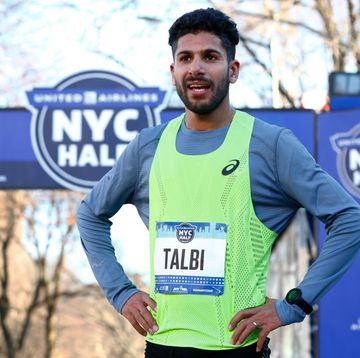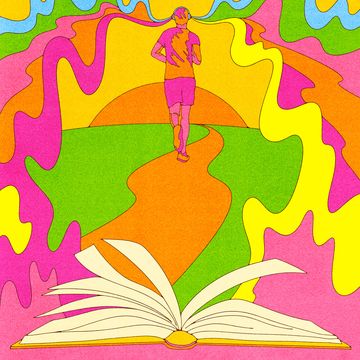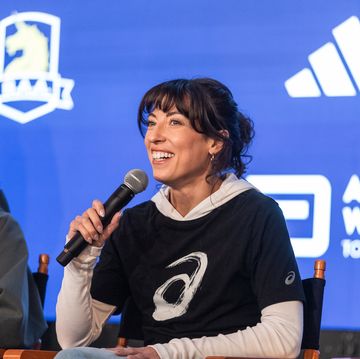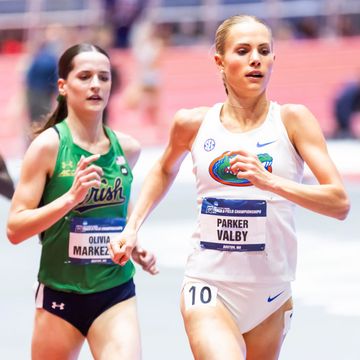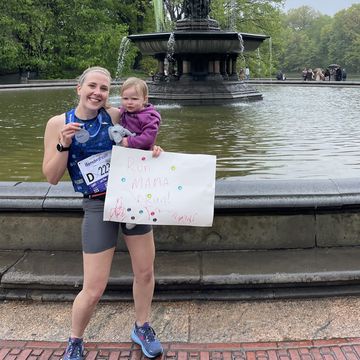After three decades John L. Parker Jr. finished the endlessly awaited sequel to his beloved first novel, Once a Runner. It almost killed him. An artist's crowning achievement is often fatal. Ulysses Grant died shortly after writing the last line of his memoir. Dreading "the curse of the ninth," Mahler was afraid to complete his Ninth Symphony. He finished it. He died. And among runners, of course, there's Pheidippides. Parker wrote the closing of Again to Carthage this spring--the lines written longhand while sitting in a canvas chair outside his Florida bungalow, his winter home. He continued to tinker with the manuscript until early September. Then, in the space of one week, he gave a reading of his new novel and ran a 5-K in Charleston, West Virginia, felt fluish, dispatched some final changes to his publisher, began coughing up, in his words, "raspberry jelly," and ended up in the hospital with myocarditis, an inflammation of the heart. And so the happy news that the book had finally arrived was tempered by the shock of its author's illness. While Parker was in critical condition at Brigham and Women's Hospital in Boston, a nation of runners sent up prayers and dispatched e-mail with a fury ordinarily reserved for the bell lap. "Kick butt in your 'race' today!" wrote one fan before doctors removed a mechanical aid from Parker's heart and it began to beat again on its own.
With Parker's survival uncertain, his girlfriend, Catherine Rosloniec, a nurse, fielded phone calls, while his younger brother Jerry set up a Web site, posting updates on John's condition two to four times a day. Jerry was quick to point out that John's crisis was unlike Jim Fixx's famous death. "This was not a heart attack, but rather an attack on the heart," Jerry said. But the inflammation caused tachycardia, which triggered heart failure. "If heart attacks bring us 1,000 cases a year," said Kenneth Baughman, M.D., the director of the Advanced Heart Disease Section of Brigham and Women's, "this sort of heart failure would be five percent of those."
More than 4,000 fans visited the Web site in the first week. Running buddies--including Olympians Jack Bacheler, Marty Liquori, and Frank Shorter--signed the guest book, as did perfect strangers who had been touched by Once a Runner, published in 1978. "It's truly Runners and Other Ghosts from the Trail," said Jerry, alluding to a collection of John's essays. "We've heard from just about everyone he ever ran with."
Two weeks later, Parker, though still weak and emotional, was well enough to have a computer wheeled up bedside so he could go online to respond to the outpouring from the running community. "Novelists try very hard to make very hard, fast connections with their readers," he wrote, "and I have been aware over the years from the occasional note, letter, or e-mail that I had at least partially succeeded with Once a Runner years ago. But the comments and good wishes from readers on this Web page and elsewhere have been just plain humbling."
The timing of Parker's finish-line drama was, of course, coincidental, if a cliffhanger worthy of art. "It almost seems like an out-of-body experience," Parker said, days after regaining consciousness. "I feel like I've come back from an astral plane. And I'm still getting used to life on this planet."
And yet, Parker promised, the sequel to Once a Runner would not be further delayed. Part training manual, part religious tract, part love story, and all about running, the first novel is so inspiring that it could be banned as a performance-enhancing drug. And it's not easy to find. Parker guesses that there are about 100,000 copies of Once a Runner in print. Single volumes of the 1978 paperback original, which cost $6.95 when new, go for $300 online. On running Web sites, the book is referred to by its acronym, OAR. Last spring, a trailer for the movie--complete with "reviews" from Rolling Stone and Runner's World, show times, and ticket prices--generated considerable excitement, but turned out to be a hoax. And OAR's sequel was reviewed favorably online--a year before it was finished.
"Once a Runner captured the excitement of what people called the 'running boom' at that time," says Tom Raynor, a friend of Parker's and the chairman and CEO of Fleet Feet Incorporated, a group of 76 specialty running stores. Raynor estimates that he's read the novel 15 times.
Marathon champion Bill Rodgers remembers that "all of us who were competitive runners in the '70s read John Parker's Once a Runner. John captured the essence of running at its most elemental level, with a special emphasis on the ultimate struggle within runners to excel."
Nor has the book lost its freshness. "Once a Runner was the first book I read when I was breaking through to the elite level," says Dathan Ritzenhein, a 10,000-meter runner stepping up to the marathon who, at 24, wasn't born when the book was written. "It motivated and inspired me. I hope Again to Carthage can do the same for the next generation."
Writing, like running, is as much about faith as it is about technique. Like the best runners, the best novelists are often just a little bit insane. However self-effacing a champion may act off the course, he's got to believe in himself. The best novelists don't just make the story up, they actually think it's true.
Both writer and runner, John L. Parker Jr. is a classic case. When I visited his winter home in High Springs, Florida, in March 2006--a year before the sequel was finished--the ground we covered in his car and on foot was crammed with landmarks that only he could see out of history and out of his first novel. Much of Once a Runner is set in and around Gainesville, where Parker ran track for the University of Florida, and later with the Florida Track Club. The five-mile course we took in River Rise State Park looked like an ordinary trail. We ran on a dirt road, then a footpath so faint even he got lost and had to backtrack. As we jogged along at a gentlemanly eight-plus minutes per mile, Parker spoke of Shorter, Bacheler, and a half dozen other heroes until we seemed to be racing in a pack of elite shadows.
My father was a novelist, and in the balance we all try to maintain between what actually happened and what makes a good story, he--like Parker--gave fiction the edge. If he got a check for $20,000 from Hollywood, it might turn into $40,000 after the evening's second drink, and shrink down to $10,000 and a headache as he staggered toward the smell of coffee that next morning. And if on the way to breakfast he should stub his toe, it might vanish into debt.
I asked Parker if the first book's success had anything to do with the delay. Coming out in the shadow of such a favorite can be daunting. A second novel, like the second career of an athlete, has additional challenges. John L. Parker Jr. has to live up to his own younger self, which, come to think of it, is a crisis faced by all runners who don't hang up the shoes at age 35.
"Oh, there's no doubt that I operated under that particular sword of Damocles the whole time, this fear of disappointing the fans of Once a Runner," Parker said. "But the extra time and gnashing of teeth seems appropriate to me now. The first book is all about youth and hormones, winning and losing, telling the world to kiss your ass. This book is a lot more poignant. The Vietnam chapter in particular. That's my real brother being shot at there, my real brother crashing his helicopter and rolling down a hill into a flooded bomb crater." The dedication of Again to Carthage reads, "To my brother Jim, owner of two Purple Hearts, and one of red, still beating, thank God, after all that."
Distance running and writing both reward diligence. There's no substitute for time on the road or at the keyboard. In both cases the process is grueling.
"When I wrote Once a Runner, I approached my sessions very much like training," Parker said. "Two sessions a day, morning and afternoon. And I had a minimal requirement for each session: two completely new pages. I've tried to do the same with Again to Carthage, but I have had more lapses in my training."
Parker said that in order to write fiction, he needed "big blocks of time. Time to be bored. Liquori said you need to be bored to train well, so that your workout becomes the most interesting part of your day."
Again to Carthage has big shoes to fill. But if this new novel is fighting the odds, then it's right in the tradition of its predecessor. John L. Parker Jr. was always enthusiastic about Once a Runner. For years, though, he was in a decided minority.
He didn't just write the novel, he formed his own publishing company and even set the type himself. The friend who helped design the cover let Parker use the equipment when his printing shop closed. "I worked through the night sometimes making editorial changes as I went along," said Parker. "You type a line and you hit a button and it goes thunk and prints it on the photographic paper. Then you have to cut up errors with an X-Acto knife. I was working in a fever most of the time, so excited to be getting it done."
I wondered what Parker thought about as he pieced together his own book. "I was thinking how much runners were going to like it," Parker said. "There's stuff about training in there, there's stuff about running history, there's stuff about physiology and biology. It was like cutting the top off my head and pouring out everything about running that was in there into this thing and just making sure it wove into the plotline."
Having printed 5,000 copies, Parker then dispatched the novel to running-shoe stores. Sometimes the copies came back, and with notes that were not appreciative. So he went to races in a T-shirt with iron-on letters. "It was blue, I think," he said, "and the lettering on the back just said something like 'Free Book' and there was an arrow pointing sort of up over my shoulder, indicating that you needed to pass me to win a free book." He wanted to make sure that other runners knew he was a real runner. He wanted to make sure they knew he was fast.
"Man, talk about hubris," Parker said. "The back cover of that first edition actually listed my PRs."
Writing the second book, Parker, now 60, had a longer past to sort through, and life brings sorrows as well as joys. "There was often very little daylight between fictional characters and their real-life counterparts," Parker said, putting his finger on the authenticity that made the first book so popular. Indeed, there are remarkable parallels between John L. Parker Jr. and Quenton Cassidy, his fictional hero. Parker is 6' 4" and weighed "162 or 3," when he was fast, running 4:06 for the mile. Cassidy is 6' 2" and 167 pounds. "More the classic, tall miler. He's smaller and faster and maybe smarter." Before writing the climactic race, Parker went out and ran a time trial to taste the agony again. It takes 15 minutes to read out loud the account of a mile that took the leaders less than four minutes to run. Parker had been Southeastern Conference Champion in the mile in 1969 and 1970. In 1978, he still ran a 10-K in less than 31 minutes. "I didn't give away a lot of books," he said.
When Parker started running in the '60s, the sport was mostly confined to people actually on a track team. The idea that the sport would gain a wide popular base seemed absurd, Parker recalled. Nobody dreamed then that there would one day be "running shorts with a little pocket to keep your key in." It was not uncommon for drivers to hoot and jeer at runners when the athletes left the track and hit the road. Parker himself had gone to college on a basketball scholarship, and only went out for track when the basketball coach left.
Inspiration for the first novel came on a run after college, on a hilly course in Gainesville called "the Bacon Strip." "You're running up into the rising sun, and I was thinking what an evocative image that was," Parker said. "I thought I should capture it. Originally it struck me that it should be a scene in a movie, and then I realized that I couldn't make a movie. But I could make a book."
Years later, Parker read an excerpt of Jim Fixx's The Complete Book of Running and decided to write Fixx's editor, Joe Fox. Fox was enthusiastic, and Parker sent him pages. Fox wrote back to say he liked the pages, but that he found the humor sophomoric and suggested that Parker ruthlessly suppress it. Decades later, the writer still chuckles when he tells of his response. "I wrote if the humor was sophomoric, it was because many characters were college sophomores."Ultimately, when Fox turned down the manuscript, as did everybody else, Parker founded Cedarwinds Publishing. Today he's frank about the toughness required to publish a book, or win a race. "I mean even Billy Rodgers, as nice a guy as he is, and Frank Shorter, the nicest people in the world, if you know what to look for, there's also a ferocity of spirit," Parker said. "They spend their lives crushing people out there, crushing people who are not used to being crushed."
If he's interested in winning, parker is not much interested in the trappings. He drives a gray 1987 Nissan 300Z with a T-top. This is the second car he's ever owned. The first was a yellow 1972 Porsche 914. "I left the top open so often that I finally just drilled holes in the floor," he said, "so that when it rained, the water could drain out."
Parker looks like the tallest, friendliest fox you ever met. He's red-haired, and there's a sharp, almost predatory intelligence behind that easy smile. For a couple of months in the winter he rents a bungalow on his brother Jerry's property in High Springs, Florida. The rest of the year he lives in a house he bought in Bar Harbor, Maine, the upstairs of which he rents out. When I first met him in 2005, the recently divorced writer was scribbling away at his sequel. His roommate in the Florida bungalow was a large parrot named Cosmo. On balmy days, the African Grey's cage was hung on the branch of a tree in the yard. Before Cosmo, Parker owned a Yellow Crowned Amazon named Willie. Like his owner, Willie was a scrapper. "He literally got fired from Bird Jungle," Parker said. "Couldn't get along with the other parrots."
Parker went to law school and ran a solo practice for a time, but he found law frustrating and tedious. He's written several books, published the works of runnerati, such as Clarence DeMar, Kenny Moore, and Joe Henderson, and written for a variety of Florida newspapers. "I wrote the speech that nominated Jimmy Carter the second time around in New York," said Parker. "The convention in New York, where Ted Kennedy famously scooted around the stage snubbing Jimmy Carter when Carter tried to make amends and consolidate the party."
Despite his amiability, a Spartan mettle is at the heart of the man that's reflected in his fictional hero. In Once a Runner, the girlfriend watches Quenton Cassidy finish a race:
"Andrea, who had never seen such things, stood close by, almost afraid to touch him, hands fluttering around each other and over to his wet singlet. The rasping, dripping, violet-shaded runner studied intently the moist earth between his spiked toes and seemed unaware of her presence. Was he all right?
"'Sure hell, he's all right,' [his teammate] Mizner said, surprised by her question. 'He's just run himself a race is all.'"
Quenton then asks Andrea what she thought of the race: "'I thought you were going to die there for a second. I was afraid.'
"'Well,' he said jovially, 'that's the cross-country biz.'"
With the publication of Again to Carthage, 30 years have passed in the life of John L. Parker Jr., but for Quenton Cassidy it's been just 10. Instead of the mile, Cassidy trains for distance. And he's wondering, as many of us do, if he can ever come back to those heady days of passion and agony. Three weeks after being flown by jet to one of the country's best cardiovascular hospitals, and with the publication of the new novel looming, Parker seemed safely--if cautiously--on the road to recovery. He was still recuperating, but already planning to personally respond to every guest who visited the Web site.
The title of Parker's new book is taken from Shakespeare's The Merchant of Venice. But the verses most powerfully evoked for this reader are from Alfred Lord Tennyson's "Ulysses," written in the voice of Odysseus. After having vanquished Troy, the cunning Greek has finally reached home. He reclaims Penelope, the famously faithful bride whose hand he had won in a foot race. But now he's bored. Having won the peace, he finds it stale. He thinks he'll go to sea again: "Though much is taken, much abides; and though/We are not now the strength which in old days/Moved earth and heaven; that which we are, we are."
Odysseus is back. Parker's back. And so is Quenton Cassidy.
="">
John L. Parker: Comeback Author
John L. Parker Jr. took 30 years to write the sequel to his classic novel Once a Runner. Then he almost died, spending 16 days in a near-coma. He along with his fictional hero, Quenton Cassidy, discovered, monumental quests can be tougher the second time.
We earn a commission for products purchased through some links in this article. Why Trust Us?
Watch Next

Advertisement - Continue Reading Below
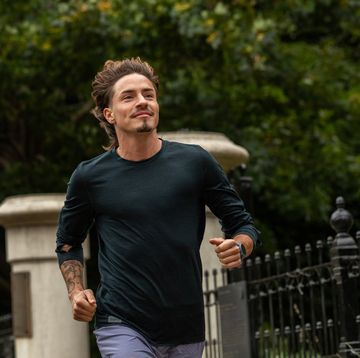
Proving That I Belong in the Sport I Love

Jeannie Rice Breaks Her Own World Record at London

He Ran Boston 8 Months After Tumor Surgery
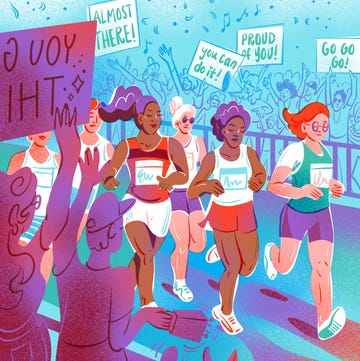
Thanks, Spectators!
Advertisement - Continue Reading Below
Advertisement - Continue Reading Below
